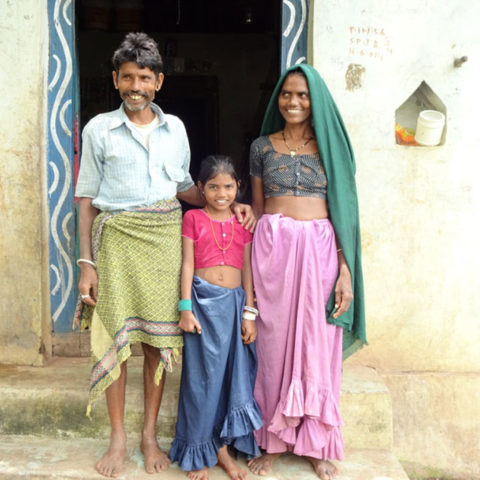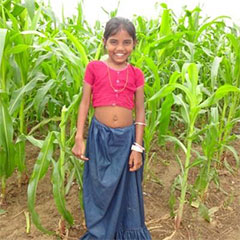
Neru’s Story: Losing out on childhood and schooling
Neru was only eight when she discovered she had leprosy. Her mother had noticed patches on Neru’s body and Neru also complained of numbness in her right hand and right leg. As time went on this numbness worsened and her hand began to stiffen and she could no longer open or close her hand, or hold things easily. Her mother took her to a government hospital where she was diagnosed with an aggressive form of leprosy and started on a multi-drug therapy. Neru did not realise how serious the diagnosis was and what impact it could have. “The doctor told me that I had leprosy, I did not feel anything but I could see my mother was very sad” she says.
Although Neru was started on a year’s course of the drugs, the prejudice and discrimination she faced showed that a physical cure was not all that she would need.
“I went to school the next day and the dinner lady, just as I approached her with a plate for food, shouted at me and told me that ‘you don’t need to come to school anymore’. After that me and the other students affected by leprosy ran from the school to home. I felt so sad about it and I cried a lot. I decided not to go school again and stopped my studies.”
This stigmatization of Neru extended to her family and her life outside of her education. “We were taking water from the hand pump near school,” she says, “People did not allow us to take water from that hand pump and were telling us that we may spread leprosy to other village people. We decided to go further away to get drinking water.”
After such treatment, it was hard for Neru not to absorb this feeling of shame: “I also felt that I have very serious disease which may spread to my family members so I just kept my distance from them and I was hiding my hand when people came to my home. I was frightened about the people in our village, I could not go anywhere to play.”
Although she had completed the year’s course of the multi-drug therapy, leprosy had caused Neru to lose out on her childhood; it had prevented her from being a part of a community and meant that for more than two years, she stopped her education.
As part of ILEP Member Lepra’s outreach, they give talks to communities, and one day they visited Neru’s village. They were able to explain to her mother how they could help her daughter with reconstructive surgery, and how they would be able to provide the funding, as well as pre- and post-operative physiotherapy. The surgery, along with the physiotherapy would mean Neru would have to stay in the hospital for 45 days. But with this treatment, she would regain full use of her arm and leg.
 In the late spring of 2017, Neru had reconstructive surgery at the St Joseph Leprosy Centre in Madhya Pradesh. By this point, she had also developed a partial foot drop on her right leg, which meant she could no longer lift her foot at the ankle. She had a course of physiotherapy and Lepra also gave her customised protective footwear to strengthen her ankle muscles. With Lepra’s help, and through determination and family support, Neru was able to make a recovery. She could walk more easily and use her hand again.
In the late spring of 2017, Neru had reconstructive surgery at the St Joseph Leprosy Centre in Madhya Pradesh. By this point, she had also developed a partial foot drop on her right leg, which meant she could no longer lift her foot at the ankle. She had a course of physiotherapy and Lepra also gave her customised protective footwear to strengthen her ankle muscles. With Lepra’s help, and through determination and family support, Neru was able to make a recovery. She could walk more easily and use her hand again.
She began to regain some of the confidence that she used to have. At the centre, she made friends and found new support from the people she met during her treatment. She also started to study once more and, as her community had heard our health awareness talks, they no longer feared the disease so she was able to use the village water pump again. However, Neru was still frightened to go back to school, worried of how she would be treated there.
Because Lepra recognizes the broad and damaging affects leprosy can have, they don’t just supply medical treatment, but emotional and practical support to individuals and family’s living with the disease. They visited the school and told the teachers her story and they were happy to allow her back, even after almost a three-year gap.
She even met the dinner lady who had turned her away: the woman took her hand, looked at it, and said how glad she was to see it healed. She said that she would look to see if any other child was showing symptoms of leprosy and refer them to the government hospital.
At first Neru’s diagnosis seemed like an end to her childhood, her education and her place in the community. Now she has returned to school and what is more wants to become a teacher herself: “I want to become teacher in our village and I will teach all the students very well,” she says.